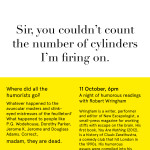A local cat called Monty disappeared this week to much consternation.
When I saw the MISSING poster reporting that he’d been CATNAPPED no less, my heart sank in part for the cat but also for myself. Being a bit silly about cats in general and fond of this one in particular, I just knew I’d end up trawling the neighborhood at night, hollering “Monty! Monty!” like the bargain basement Jon Ronson I so clearly am.
As I rounded the corner, I saw some people in line at a bus stop. They were laughing. “How could they be so callous?!” I thought, “How could anyone laugh on a day like this, when Monty has been seized?!” Some lunatic out there was feasting upon his bones or — worse — dressing him up in little ribbons and making him dance. I for one wouldn’t be laughing again. I’d wear a black armband, I decided, until he turned up.
But then I saw what they were laughing at. They were laughing at Monty, who was sitting in his usual spot, surrounded by his own MISSING posters.
I stopped, hands on hips, and looked down at him. God help me, I think I might actually have expected an explanation.
He gave me his usual coquettish “meow” as if nothing odd had happened at all, the little bastard.
I’m awfully fond of Monty. I see him almost every day and the only times I don’t stop to fuss him behind the ears is if someone’s already there and fussing him behind the ears.
He has an excellent personality. His way is to sit on the ornamental beer barrel outside a local bar, simply waiting for the attention of passersby. He gets an awful lot of it too, from neighbours, shop workers, commuters and school children.
Clearly, the secret of a successful cat is foot traffic.
The other secret must be social media presence; later in the day, I checked Twitter to see if I might learn what had happened to warrant the MISSING posters. Twitter had been momentarily in uproar at reports of his being catnapped. There were people in Australia tweeting about him. I also learned that the little prick has two different Facebook pages. One for friends and one for fans.
He’s even on Google Streetview. Well, he would be wouldn’t he? Anyone can get on Streetview if they’re committed and consistent enough, though it should be noted that Google didn’t see fit to blur Monty’s face, so winning is his personality.
Anyway, from what I could gather, he’d been taken off by someone who’d mistaken him for a stray, but who had then returned him when she’d spotted the posters and understood her mistake.
Strangely, I can see how this would happen. I’m not saying he brought it on himself–no cat victim blaming here–but Monty has a certain charisma and it’s easy to feel bit drunk when he’s around. He’s also quite docile himself and I’m certain he’d have been perfectly amenable to being lifted by a stranger and stuffed into a box. Look, we’ve all been there.
He’d been returned some hours before I came along and saw the MISSING posters so I only had to worry about his fate and mine (“Monty! Monty!” — I mean, my God, that’s no dignified activity for a tall man) for the time it takes to walk one block and gnaw just two fingernails to the hilt.
I wonder what he thinks about it all now? Does he remember his little jaunt? Does he have any stance on this unusual chain of events whatsoever? I’ve been trying to gauge any change in his mood but he just seems to be his usual old self, reluctant to follow my finger or answer any questions.
I’m glad he wasn’t away long.



 Another fine instalment of Meadhbh Boyd’s teen diary-reading nights. This time we did it as part of the main Glasgow comedy festival over two nights. I was there doing my fauxward thing. Solid walls of pure lady laughter. Ace.
Another fine instalment of Meadhbh Boyd’s teen diary-reading nights. This time we did it as part of the main Glasgow comedy festival over two nights. I was there doing my fauxward thing. Solid walls of pure lady laughter. Ace. In October 2015, I took a performancy talk to Glasgow’s Project Cafe, as part of a social enterprise called MyBookcase. I talked a little about humour writing, read from the work of my favourite dead humorists and from my own book, A Loose Egg. I’d like to do a bit more of this sort of thing.
In October 2015, I took a performancy talk to Glasgow’s Project Cafe, as part of a social enterprise called MyBookcase. I talked a little about humour writing, read from the work of my favourite dead humorists and from my own book, A Loose Egg. I’d like to do a bit more of this sort of thing.  On May 21st 2015, I dusted off my childhood and teenage diaries to read at
On May 21st 2015, I dusted off my childhood and teenage diaries to read at  On 10th October 2011, I took part in
On 10th October 2011, I took part in  In August 2011, we read sections from
In August 2011, we read sections from  We ad-libbed our way through four live versions of our
We ad-libbed our way through four live versions of our  As if at the whim of a
As if at the whim of a  Compared by
Compared by  Under the banners of our publications,
Under the banners of our publications, 
 I did two spots at
I did two spots at  At an event in a house, called ‘Come Away In’, I was asked to do stand-up comedy in the front garden. It didn’t really work and I felt unpleasantly exposed. My second set in the back garden was much better. I decided to perform atop of a step ladder in the middle of the lawn. I introduced myself as a comedian, climbed the ladder and read (for over an hour) from a found book of ‘pub jokes’, dissembling the racism and sexism as I went along. It rained but I carried on. I’d like to do this again somewhere, but provide buckets of fruit for people to throw.
At an event in a house, called ‘Come Away In’, I was asked to do stand-up comedy in the front garden. It didn’t really work and I felt unpleasantly exposed. My second set in the back garden was much better. I decided to perform atop of a step ladder in the middle of the lawn. I introduced myself as a comedian, climbed the ladder and read (for over an hour) from a found book of ‘pub jokes’, dissembling the racism and sexism as I went along. It rained but I carried on. I’d like to do this again somewhere, but provide buckets of fruit for people to throw.  I redundantly served as MC one night for
I redundantly served as MC one night for 
